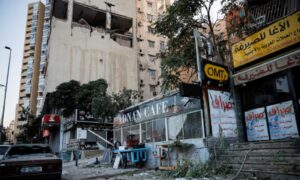Bangladeshi migrants in Lebanon struggle for safety, seek urgent repatriation
At least five Bangladeshi nationals have been injured—three in southern Lebanon and two in Beirut—according to the Bangladesh embassy.
Thousands of Bangladeshi migrants are facing dire conditions in Lebanon as Israeli airstrikes target major cities with many fleeing from the southern part to Beirut in search of safety amid the escalating violence.
At least five Bangladeshi nationals have been injured—three in southern Lebanon and two in Beirut—according to the Bangladesh embassy.
Many migrants without access to shelter are reportedly living in the open. They are eager to return to Bangladesh, but foreign airlines are not operating flights, making it impossible for them to leave.
Migrant workers have urged the Bangladesh embassy in Beirut to arrange special flights for those wanting to return.
Sheikh Mamun, a migrant from Gopalganj who has been living in Lebanon for 14 years, told TBS over the phone, “Hundreds of Bangladeshis are sleeping in the streets. We, the expatriate communities, are doing what we can to provide food, water, and financial support to those in need. The embassy is also helping, but there are so many people who need help.”
Mamun, who works for Mazda in Beirut, explained that while some shelters have been established, Bangladeshis have not been able to access them properly. As a result, many are forced to stay in unsafe conditions.
“The situation is so critical that the airport has been closed. Those who want to return home have no way to leave,” he added.
Mamun also mentioned that he is caring for 50 people in a small shelter. “There are women here who need food and milk for their children, and many were unable to bring their belongings due to the bombings.”
There are approximately 100,000 Bangladeshis working in Lebanon, with around 40% being women, according to unofficial estimates.
“About 20,000-25,000 Bangladeshis from southern Lebanon have moved to Beirut, especially around the Rafik Hariri Mosque and Hamra Sanaya Park. Most people want to go home, but due to the lack of documents and the closure of the airport, they cannot,” said Mamun.
Mamun expressed concern about the potential escalation of the conflict. “If the situation worsens, these people will be facing a disaster. The embassy should organise their return on special flights at the state’s expense.”
Md Anwar Hossain, first secretary (labour) at the Bangladesh embassy in Lebanon, told TBS over the phone, “Only the Lebanese national airline is flying, and that too on a limited basis. No other country has evacuated its citizens so far.”
He added that the embassy has informed the foreign ministry in Dhaka about the situation and will follow further instructions regarding evacuation.
On the issue of migrants sleeping in the open, Hossain said, “We have offered shelters, but many of them do not want to go too far from the city.”
Babu Saha, a Bangladeshi journalist based in Beirut, reported that many Bangladeshis in Lebanon work as domestic workers, cleaners, and labourers in the manufacturing sector.
“Bangladeshis earn between $300 to $700 a month. This crisis comes just as Lebanon was recovering from an economic recession, so these workers will face significant difficulties,” he said.
The number of Bangladeshi workers going to Lebanon has almost doubled this year compared to 2023.
Last year, 2,594 workers travelled to Lebanon on work visas, while in the first seven months of this year, 4,225 people have made the journey, according to the Bureau of Manpower, Employment and Training.
The conflict had not seriously impacted Lebanon since the fighting between Hamas and Israel began in October last year, but the situation has deteriorated rapidly over the past week.
The conflict escalated on 23 September when Israel launched its largest air campaign in years, targeting southern Lebanon after issuing evacuation warnings to residents. Over 1,300 targets were hit, predominantly in the south, marking the most intense air raids in recent years, according to Al Jazeera.
Four days later, Hezbollah’s Secretary-General, Hassan Nasrallah, and senior commanders were killed when Israel dropped 85 ‘bunker-buster’ bombs on a southern suburb of Beirut in a devastating airstrike that levelled multiple buildings.





